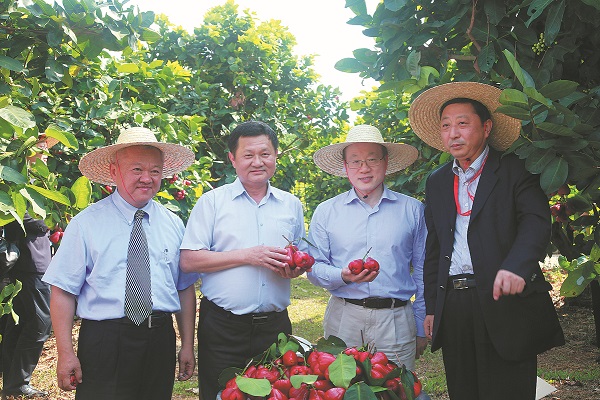
Huang Yifeng (second from left) poses with three visitors at one of his wax apple plantations in Hainan province. CHINA DAILY
For wax apple grower, success doesn't fall far from the tree
At the largest wax apple plantation in Hainan province, there is a slogan on the wall: "Taiwan's experience, shared and rooted in Hainan".
Huang Yifeng, general manager of Hainan Jindefeng Agricultural Development, is the first person to apply intensive farming to wax apples on the Chinese mainland.
"And now, my wax apple plantation blooms and bears fruit all year round," the Taiwan native said.
The 61-year-old added that the combination of his experience with agricultural technology and management in Taiwan, along with the vast Chinese mainland market, has enabled the production and sale of Hainan's wax apples to flourish.
Back in 1997, Huang came to the mainland from Pingtung county in Taiwan on an inspection trip. He planned to plant wax apples and visited two provinces — Guangdong and Hainan — before choosing the latter for the project.
"Hainan's climate, as well as its culture and customs, are similar to Taiwan, and the mainland's huge market offers infinite possibilities for business development," he said.
Like many Taiwan entrepreneurs, Huang seems to have a natural instinct for finding opportunities. At the time, he was confident that if Taiwan could grow wax apples, so could Hainan, but he later realized that starting was the hardest part.
Few people knew about wax apples at the time. When they first saw the fruit, many asked him what kind of flower it was and whether they could eat it.
The public's lack of knowledge about the fruit aside, it was also difficult to keep the wax apples fresh. If left for too long on the shelf, the fruit quickly loses its taste.
In Taiwan, the entire process from picking to selling usually takes less than a day, so wax apples are always at their best. But on the Chinese mainland, that process used to take five or more days, particularly when selling the fruit in major cities such as Beijing and Shanghai. Huang said that he was forced to pick the apples before they were ripe, but even so, half of each consignment would be rotten by the time they arrived in big city stores.
Later, thanks to improvements in cold chain transport, this problem was gradually resolved, and his company started marketing online. He said that the Hainan government helped introduce him to many online platforms, including e-commerce giants JD and Taobao.
For over two decades, Huang has dedicated himself to introducing and promoting the fruit, frequently visiting Beijing, Shanghai and other major cities across the country. Today, Hainan Jindefeng Agricultural Development has three plantations in Haikou, Wenchang and Tunchang, growing roughly 50,000 trees on about 1,113 hectares of land.
The company's self-developed variety, known as "China Red", is a national bestseller, and Huang has become known as the "king of wax apples". His plantations are held up as successful models of agricultural cooperation between Hainan and Taiwan and have won the title of "key leading enterprise of agricultural industrialization in Hainan province", while their products have been certified as both organic and green.
Huang is also helping with the development of Hainan's wax apple sector. He has trained 700 students at the Hainan Agricultural School and has helped villagers around his plantations plant 33.33 hectares of the fruit.
As one of the few places in the country suited to growing wax apples, Hainan is now engaged in large-scale cultivation. The emerging sector is raising farming incomes and efficiency, and wax apples have come to symbolize Hainan's efficient tropical agriculture.
In recent years, to expand the industrial chain and improve the fruit's added value, Huang's company has produced wax apple wine, juice and vinegar. Now, with the construction of the Hainan Free Trade Port, he believes development in the province has good momentum, and he wants to continue importing other high-end fruits as well as agricultural experience from Taiwan.
"'Taiwan's experience, shared and rooted in Hainan' is not an empty phrase," he said. "Now, with Hainan making headway in building a free trade port, and with the deepening of reform and opening-up, I believe Taiwan business owners in Hainan will enjoy greater dividends as a result of local policies."
He encourages more young people from Taiwan to come to the mainland.
"The Chinese mainland market has a very bright future, and there are great opportunities for young Taiwan people to develop their careers here, especially in agriculture," he added.